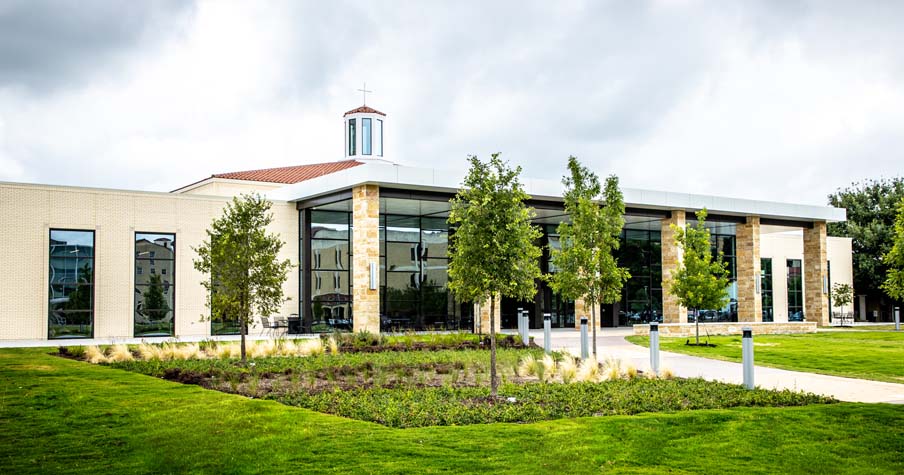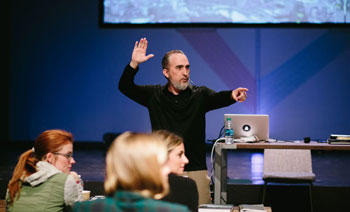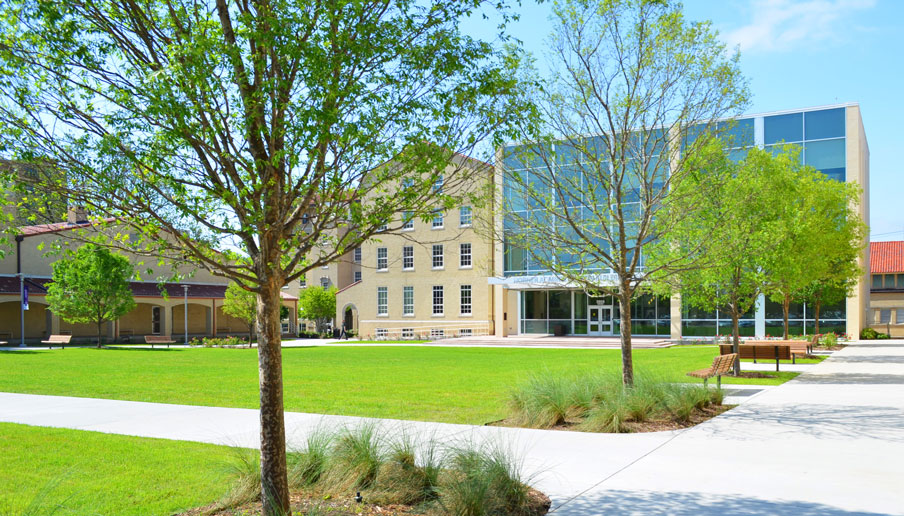
A pioneering school nearing its centennial. A president who assumed office in the teeth of a world-consuming viral crisis, quarantined halfway around the world. A board’s decision to build a new student center and chapel. one story of courage, faith, and grace.
In October 2019, Dallas Theological Seminary’s Board of Incorporate Members named Mark Yarbrough, Ph.D., to become the next president, succeeding retiring President Mark Bailey, Ph.D., on July 1, 2020. Yarbrough has a long history at DTS, as a student, professor, and administrator – he was vice president of academics when he was named as the seminary’s sixth president. In Trust’s Matt Hufman talked with Yarbrough about his transition during the pandemic and lessons learned.
What was the transition like – or supposed to be like?
Mark Bailey and I had this big metaphor because we’re both preachers, so this is very preacheresque. There’s that scene on any relay track where you’re passing the baton, and you run together for just a little stretch. That was the metaphor that we used a lot to describe the situation.
I was appointed in the fall of 2019, and then in March, I was leading a tour of pilgrims in Israel and COVID was chasing us. We were the next to the last plane to land at Tel Aviv.
And I had a group of mostly first-time pilgrims to Israel. So we’re seeing the sights but we’re watching the news, and COVID is literally chasing us. By the time we made it to Jerusalem, we ended up getting quarantined at a hotel on March 15. That’s when the world stopped spinning for me. And that metaphor changed. Instead of, “We’re running together and handing it off smoothly,” it was Mark Bailey throwing the baton into the air and saying, “Mark Yarbrough, I hope you can run underneath it and catch it.” The world changed on March 15. It just did for all of us.
And so in many ways, even though the technical appointment was July 1, we, like other institutions, did the pivot. There’s our COVID word, and we pivoted. We had to flip 390 classes in about six days.
Because we had been heavily involved in distance education and online courses and things like that, it actually was a fairly easy thing for us to do. It was just time-consuming. You just had to get it out and make it all happen.
And so it was interesting because every decision that we made from that point forward was really toward the future. So in many ways, the presidency started there at that moment.
Did the vision shift from what was discussed during the hiring process to taking over during a pandemic?
It didn’t. Now, how we did it, yes, that changed. I have a phrase that I use a lot, and I have no idea where it came from, but it’s a theme of my life. I said, “Look, we are married to the mission, and we date the methodology.”
What I mean by that is that we have a mission and it is, number one, to glorify God by equipping Godly servant leaders for the proclamation of His word in the building up the body of Christ worldwide.
We’re an institution that is called to equip Godly servant leaders. That’s who Dallas Seminary is. We prepare people to know God’s word better and to take the greatest news that this world has ever heard and to share it in their spheres of influence.
Regardless of what happens – whether we’re in a pandemic, or whether we’re in the darkest areas of the valley, or on huge mountaintop moments – our mission hasn’t changed. How we execute that mission may change. Circumstances can determine how we have to pivot.
In one sense, I did realize that I needed to start using that kind of language because in the middle of what I call the pandemic panic, what does the future look like? My response is to say that it doesn’t matter what the future looks like, that we are called to execute the mission to which we have married. And so we trust that God will give us the creativity to say, “What do we need to change in how we execute that mission?” But the mission hadn’t changed.
And with the wisdom of our board, and the passion of our faculty, and the faithfulness of our staff, we rallied the troops and said, “OK, how do we need to move forward?”

What did that look like in practical terms?
There was constant communication. We had extra board meetings because we had some very significant decisions to make, some that were very practical, some that were philosophical.
For example, the Bailey Student Center and Chafer Chapel did not exist in May 2020. That building was built during the heart of COVID and the pandemic. That’s the grace of God. We had been working on that project, like a lot of schools do, with capital campaigns and soliciting funds from very faithful donors that stand with us. It was a three-year process, and it had been delayed because of very significant growth in the Dallas-Fort Worth area. It was out of our control with getting city permits and things like that. We were ready to roll but we were just literally waiting on the city.
Well, COVID hits March 15, and wouldn’t you know it? Three weeks into that moment, we get our final permits from the city of Dallas to build a $14 million building.
Well, we were already having discussions just like everybody else was about the future. And, remember, I’m quarantined in Jerusalem, and I literally had to go through that very unpleasant task of designing potential budget cut scenarios for the institution.
We had to be prepared, and we don’t know what’s going to happen. How bad is this going to be? How’s it going to impact us on enrollment and giving and all that kind of stuff? It’s painful.
Well, here’s what I know: What if you start moving forward building a $14 million building, and you have to make a 30 percent budget cut, even though they’re funded from separate buckets? That’s a tough pill to swallow, particularly from the public relations side.
This building had been three years in the making and faithful people standing with us giving money for that particular project, and it’s earmarked, it’s ready to go, but you don’t want bad PR if you have to make cuts. So that was a huge test for us.
We had a real decision to make, and it was a moment honestly of trust and prayer and commitment to the Lord. We committed to prayer and fasting and asking the Lord to really lead us in the right direction.
There are two philosophies at stake here. Do you keep centered on the mission and put the pedal down, or do you play the hunker-in-the-bunker game? Do we freeze everything we had planned and stop and just wait for – here’s the COVID phrase – things to get back to normal?
We made the decision, and it was a faith decision. The Lord in His kindness chose to bless it. I want to use very specific language here: It was grace. We felt the Lord say, “The mission hasn’t changed. Keep moving forward, Dallas Seminary.” That’s what we did, and we started that building project in May.
It’s the grace of God. Now, do we trust in brand new ways? The answer is, yes. I promise you that.
Sustaining Consistency
Through its history, Dallas Theological Seminary’s leaders have continued to serve in an active role after stepping down. DTS may be unique, as it’s not considered a best practice. But President Mark Yarbrough wouldn’t have it any other way. His predecessor, Mark Bailey, serves as chancellor. Bailey’s predecessor, Chuck Swindoll, is chancellor emeritus.
“I think that honors the Lord,” Yarbrough said. “It provides consistency. Those two men made have made it very clear that they don’t meddle, they don’t question. They are champions and encouragers and prayer warriors and individuals that care for this school and for me personally.
“Why wouldn’t you want that?”
When it’s my turn to hand the baton off, I pray it’s in the same way.”
— Mark Yarbrough

So you pressed on, despite the pandemic?
We felt that the Lord just wanted us to put the pedal down, and so that’s what we did. We did that in a lot of different areas.
During the pandemic, we created new degree programs that were in part listening to culture and the church. Dallas Seminary exists for the local church, and we’re privileged to work alongside of, and with, other parachurch ministries and mission agencies.
We launched a new master of arts during this time in apologetics and evangelism. Evangelism has always been part of our heartbeat. I don’t think any Christian institution that reads the Bible can miss Matthew chapter 28. It’s at the core of Christianity.
We launched that program because our students want to have a better grasp on the defense of the faith. And that’s one of the roles of apologetics. But it’s also for extending that understanding to others. We also launched a master of arts in chaplaincy and ministry care. There are three particular tracks: the military, medical care, and the mission of workforce in the secular world. It has been amazing.
We’re having companies that will call and say, “I need a chaplain,” which is really fascinating. What the employers know is that on a real pragmatic sense if their employees are taken care of and are loved, they’re going to be better employees.
We also have just started a new division at the school, the Division of Global Ministries. We have always been a very “globally minded for the nations” school. As I said, I think any Christian organization should aspire to that at some level, because, again, of Jesus’ words, “Go and make disciples of all nations.” It’s pretty clear. The Lord has been so gracious to us with a large student body that is made up of every tongue, tribe, people, and nation, and it’s a joy to see.
During the COVID year every embassy on the planet was closed, and our regular flow of students from the nations couldn’t come that year. That hurt in many ways. Interestingly enough, by grace, we were able to reach out in brand new ways with technology and to reach new students, which has been an amazing thing to see.
But there’s also another door the Lord has opened for us. About three years ago, we took some of our graduate-level online courses and we pulled portions of that out and we created a curriculum around it. We first offered an online class on the gospel of John free to the world and it just exploded. There was a cry and a demand for more. We’ve now developed 21 of those courses, and we’ve crossed over 440,000 students that are taking courses. I can show you 75 students that are full-time graduate students with us that have come out of that. Some are international students as well.
About half of those who have taken a free class are associated in the United States and Western European countries, but the other half are coming from the places on planet where the gospel is growing like wildfire in Southeast Asian, sub-Sahara Africa, and Latin America.
These are individuals that may never have an opportunity to uproot their lives and come and study on a campus like Dallas Seminary.
There’s a global crisis right now in the church. There are about two million pastors on the planet, and of those that are serving in the pastorate, only five percent have ever had any kind of formal education.
I think it’s a call to the church of the West. We need to be aware of the global crisis and ask ourselves the question: What are we doing to be part of this together, working with others to help solve a crisis on the planet as it relates to the church?
We’re asking ourselves a lot of those real hard, difficult questions right now of: Would the Lord even use a place like Dallas Seminary to be involved in a non-formal way of equipping pastors worldwide? And we believe the answer to that is, yes.
We’re not dropping what we’re doing. We’ve had five semesters of record enrollment in a row. We crossed an all-time high with over 2,600 students this semester. So what we’re doing is with the Lord’s grace, and we’re also saying, “OK, how can we help over here as well?”
Because ultimately, what’s the core of our mission? It’s equipping Godly servant leaders, whoever they are. So that’s the mission of the mission. And so we’re just asking the Lord, “How can we be effective stewards of what you’ve asked us to do?”
We want to be a campus community that is focused on the mission.
Upholding Bible Focus
Dallas Theological Seminary has been known for its focus on biblical exposition, academic rigor, and dispensational theology. President Mark Yarbrough says that won’t change. “Ultimately, I believe students come here because they want to be anchored in the word,” he said. “We make no apologies about that. We have more Bible and theology in all of our programs than almost any other school, and I don’t say that in a braggadocious way. It’s not critiquing others. This is something we very much believe in. It’s who we are.”
“We will never, ever regret being thoroughly equipped to execute the mission to which God has called us to do.”
— Mark Yarbrough
What are some lessons you’ve learned from the pandemic?
They’re honestly some real basic things. I have learned that my prayer life is not what I want it to be and not what I need it to be. I pray more now than I ever have before. Also, I need to learn to be a better listener. In terms of the mission, I’m a preacher of the mission, and I do think that’s important for all of us in this very distracting world to keep the main thing the main thing.
And this is something that I’ve preached, it’s a phrase that I’ve used, and it has shown up in several sermons over this last 18 months: God does some of His greatest work in the midst of the mess. I think we need to remember this because it is the story of the gospel of Jesus Christ. So, if we find ourselves in the mess, let’s look for the great work of God.